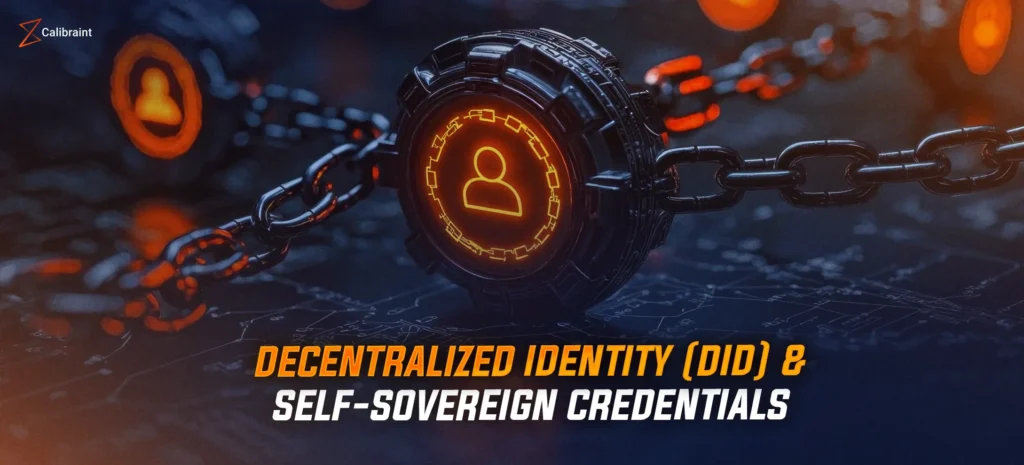Decentralized Identity (DID) & Self-Sovereign Credentials: The Future of Digital Trust

In the age of surveillance capitalism, centralized data breaches, and password fatigue, there is a growing demand for solutions that prioritize individual control over identity and data. Enter decentralized identity (DID) and self-sovereign credentials the foundation of a more secure, privacy-preserving, and user-centric internet. But what do these terms really mean, and why are enterprises and governments across the globe betting big on this emerging technology?
This blog post dives deep into the concepts of decentralized identity, the shift toward self-sovereign identity, and what it means for the digital world.
What Is Decentralized Identity?
Decentralized identity refers to a framework where individuals or entities can create, manage, and control their digital identities without depending on a central authority or intermediary. Unlike traditional identity systems where user data is stored and managed by third parties (banks, governments, platforms), decentralized identity systems are built on blockchain or distributed ledger technologies (DLTs), enabling tamper-resistant and verifiable credentials.
The goal? To give users ownership over their identity no more asking permission from a third party to prove who you are.
In essence, decentralized digital identity empowers people to prove their credentials (like age, nationality, or professional qualifications) without revealing unnecessary personal information.
The Evolution from Centralized to Decentralized Identity Management
Traditional identity management relies heavily on centralized models, think of signing in to various services using Google, Facebook, or Apple. These models come with risks:
- Data silos prone to breaches
- Limited user control
- Excessive data sharing
- High costs for compliance and infrastructure
Decentralized identity management, on the other hand, is built on blockchain principles. It eliminates single points of failure and enables secure, peer-to-peer interactions.
Under this model, users own private keys associated with their identifiers. Identity data is not stored on a central server but instead remains with the user or in encrypted, decentralized storage solutions. Blockchain acts as a verifier confirming that a credential was issued and hasn’t been revoked, but without storing the credential itself.
This fundamental shift changes how trust is established online.
The Rise of Self-Sovereign Identity (SSI)
Self-sovereign identity is an extension of decentralized identity, where individuals gain full control over their identity data and how it’s shared. The principles of SSI include:
- User Control & Consent: The user decides who gets access to their information.
- Interoperability: Credentials can be used across systems and platforms.
- Minimal Disclosure: Users can prove claims (e.g., “I am over 18”) without disclosing additional data (like date of birth).
In the decentralized vs self-sovereign identity conversation, it’s essential to understand that while all SSI systems are decentralized, not all decentralized identity systems are self-sovereign. True self-sovereignty means complete independence, no reliance on a single issuing authority or centralized database.
Real-World Applications of Decentralized Identity
- Financial Services: Know Your Customer (KYC) procedures can be streamlined with verifiable credentials that eliminate redundant verification across banks.
- Healthcare: Patients can carry digital health records that are verifiable and shareable with chosen providers.
- Education: Universities can issue tamper-proof diplomas, instantly verifiable by employers.
- Government Services: National ID programs can adopt decentralized infrastructure to give citizens better control while improving security.
- Enterprise Onboarding: Employees can use pre-verified credentials to access systems, reducing the risk of insider threats.
The decentralized identity ecosystem is growing fast with the involvement of players like Microsoft’s ION, IBM’s Trust Your Supplier, and initiatives by the World Wide Web Consortium (W3C) for DID standards.
How It Works: A Simple Breakdown
Let’s break down the process with a simplified scenario:
- Creation: Alice sets up her digital wallet and creates a DID.
- Issuance: Her university issues a digital diploma as a verifiable credential.
- Storage: The credential is stored in Alice’s digital wallet.
- Presentation: She applies for a job and shares only the relevant part of her diploma.
- Verification: The employer checks the blockchain to confirm the diploma’s authenticity without contacting the university.
All this happens without Alice’s personal data being stored on a central server.
Benefits of Decentralized Identity
- Privacy-first architecture
- Reduces reliance on passwords
- Eliminates vendor lock-in
- Improves compliance with data regulations like GDPR
- Lowers risk of mass data breaches
- Gives individuals digital dignity
Organizations benefit too. Verification becomes faster, fraud is reduced, and trust is built without intermediaries.
Challenges and Roadblocks
Despite its promise, decentralized identity is not without challenges:
- Adoption Hurdles: Users and organizations need education on managing digital wallets and keys.
- Interoperability: Fragmented standards can create confusion.
- Revocation Mechanisms: How do you revoke a credential if compromised?
- Regulatory Clarity: Many countries are still shaping digital identity laws.
- Scalability: Blockchain scalability issues may hinder real-time authentication needs.
The self sovereign identity market is addressing these challenges with solutions like zero-knowledge proofs, DID communication protocols, and more collaborative governance frameworks.
The Future of Digital Identity:
As Web3 and decentralized infrastructure become mainstream, decentralized identity will be foundational to how we interact online from social media logins to cross-border voting.
Imagine logging in to a platform with a QR scan instead of a password. Or proving your age to buy a product without revealing anything else. These are no longer futuristic dreams but feasible implementations thanks to DID.
Governments and enterprises need to collaborate on building trust frameworks that ensure user safety while fostering innovation.
Conclusion
Decentralized identity and self-sovereign credentials are not just buzzwords; they represent a paradigm shift toward user empowerment and digital trust. As the decentralized identity ecosystem matures, the opportunity to reimagine digital interactions free from surveillance, lock-in, and data overreach is within reach.
Whether you’re a startup exploring privacy-first solutions or an enterprise looking to streamline verification, understanding what decentralized identity is and how it’s reshaping the digital world is no longer optional.
We’re at the edge of a new internet one where identity belongs to the individual. Let’s build it responsibly.





















